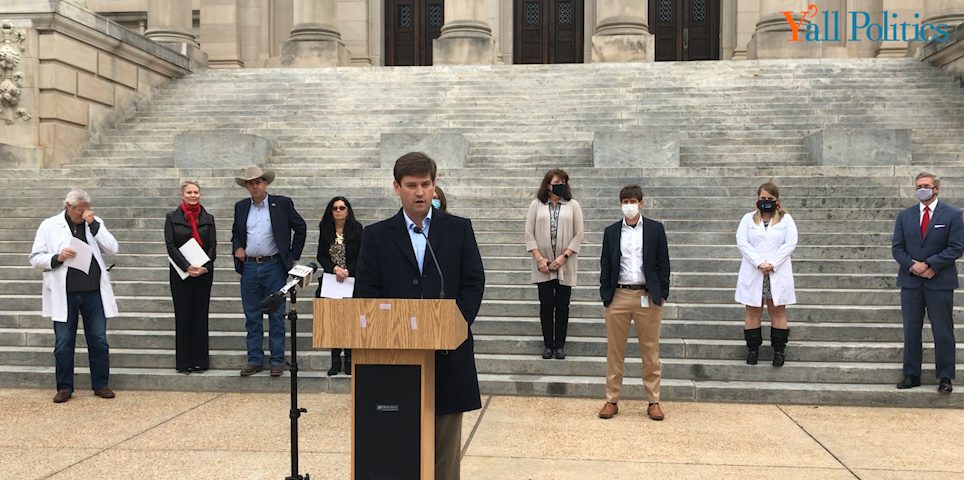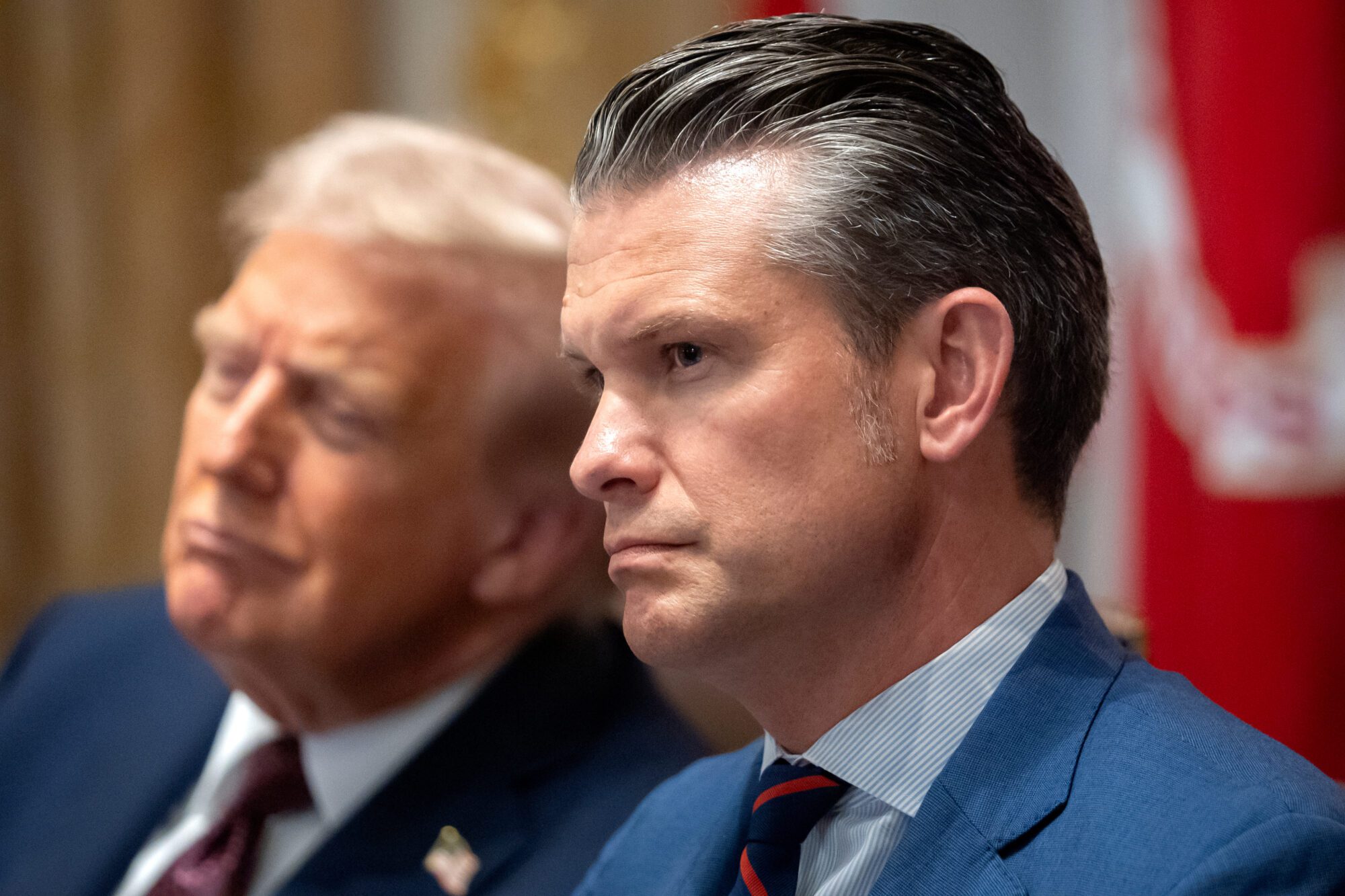
With Tuesday’s general election quickly approaching, several state leaders and healthcare professionals took to the Capitol steps Friday to shine one last light on the details of Initiative 65.
The main complaint that seemed to resonate among all of the speakers was how Initiative 65 would become law in Mississippi. Because the initiative was brought to the ballot and will be voted on by the people, it will become law by integrating into the Mississippi Constitution. That is only if the measure is voted on by the people and receives more yes votes than Initiative 65A does.
“One of the things that’s really worried me this week is that people don’t really know what we are getting into,” said Dr. Thomas Dobbs, the State Health Officer. “I’ve been talking to people who are highly respected, leaders in the community who will say to me, ‘Well if it doesn’t work out the way we like it, we’ll just change it.’”
Unfortunately, that will not be the case.
If Initiative 65 is passed and put into the Constitution the program cannot be changed, altered, or manipulated by any other means than by another ballot initiative and vote of the people. The initiative places the Mississippi State Department of Health as the managing agency over the program, a job Dobbs says the department does not want nor is able to handle in the midst of the current pandemic.
“The health department is about to embark on the most ambitious immunization program that the world has ever seen, at the same time that we would be imposed upon to create the entire infrastructure of a medical marijuana industry in the state of Mississippi,” said Dobbs.
When it comes to priorities, Dobbs said medical marijuana is not even in the top 20 across the United States.
“Can you imagine marijuana dispensaries cropping up in all of our communities across the state and there is nothing anybody could do about it,” said Ag Commissioner Andy Gipson. “Nothing the Legislature could do about it, nothing law enforcement could do about it. 500 feet from your schoolhouse 500 feet from your church house. That’s what we’re talking about here with no opportunity of the people to weigh in on it.”
Gipson said the initiative also will not have a benefit for Mississippi farmers. He said the initiative does not say anything about where marijuana would be grown. There is no indication that the product will be grown in the state.
“I think it is the worst initiative to ever cross the isles of any ballot initiative anywhere, any place and here it is in Mississippi,” said Gipson. He said he has no doubt that there are a lot of people who support the idea of treatment with marijuana components, but this initiative is not the way.
The Commissioner said as a conservative he believes in the rights of the people and smaller government. That sentiment alone is why he says conservatives should not vote for this initiative, even if they agree with medical marijuana usage.
Gipson added that he does not agree with any one agency having total control over a concept, which is what Initiative 65 does. It puts the entire program in the hands of the State Department of Health but does not give them actual authority in changing or modifying it as the language would be set in stone in the Constitution.
“If you support medical marijuana treatment, why would you give total and complete control over a program to an unelected Department of Health who doesn’t even want this program,” said Gipson.
Gipson said there is also an issue on whether or not possessing a medical marijuana card could infringe on your right to be able to own a gun. Because marijuana is still classified as a schedule one narcotic, if violates federal law to possess a firearm while also possessing cannabis.
“Well, will the federal ATF be able to come take your hunting rights away if you get a statewide marijuana usage card. According to the state of Michigan, ATF has indicated that’s exactly what they would do there,” said Gipson.
He said if you want to support the concept, you can vote against both of them and for 65A. He said if 65A moves forward, individuals will have the opportunity to make their preferences known to their representative to be included in the drafting of the program.
Representative Jill Ford, who was part of the original group of legislators to begin fighting against Initiative 65, said it is her opinion that it is a shady attempt to provide safe harbor for pot usage in Mississippi communities.
“I do not believe that those who crafted Initiative 65 were as concerned about those living in pain as they are about the money that can be made,” said Ford. She said if that were their true concern, they would have written a better program that protected the state, as well as, its people.
Ford said this reason is why the Legislature proposed 65A as an alternative. While many have called their proposal an attempt to “do nothing,” she said this proposal would mandate the Legislature initiate a medical marijuana program, and if they did not, would give any Mississippian the right to file suit against them.
“It is truly a shame that the proponents of Initiative 65 are using our heart strings as a way to hook us into their deception, which will turn into lining their pockets,” said Ford.
Senator Angela Hill also said that Initiative 65 has not been represented appropriately by those who are sponsoring it. She likened the legislation to that of Oklahoma’s which has over 2,000 “pot shops,” as she called it, across the state.
Those for the initiative have disagreed with this statement, saying that the initiative was written as conservative legislation and not like that of Oklahoma’s.
Hill read a text message from a constituent of hers that was currently in Oklahoma as a volunteer fire fighter helping with Ice Storms. The individual sent messages regarding the state of Oklahoma’s distribution facilities in local communities.
She read aloud:
“I’m in Oklahoma City right now working an Ice Storm. There seems to be a dispensary on every block. The buildings the dispensaries are in are just about all run down and trashy looking. Meanwhile, they have people out in front of the store advertising by waving a big flag with a marijuana leaf on it, not at all what I expected to see. I actually expected to see these places look for like pharmacies but that isn’t the case at all. I can send you some pictures tomorrow.”
Hill went on to add that this is the reality of 65, because the program does not limit the number of licensures for distribution centers. It also only has one zoning requirement, and that is that it cannot be within 500 feet of a church or school. Any other regulations cities would like to impose would be superseded by the Constitution.
“We want to be able to give those local people a say and your elected representatives a say in having a responsible legitimate way for people to access medical cannabis,” said Hill.
Dr. Jennifer Bryan, Chairman of the Mississippi State Medical Association and family physician, called the initiative a dangerous fallacy.
“As a physician we took an oath to do no harm, you’ve seen our steady massaging during the pandemic and at times it has been hard, and we’re doing it again when it comes to medical marijuana,” said Bryan. “We resent being called prudes or as if we are not with the times when we talk about dangerous public health policy. 65 is dangerous and 65A is a better way.”
Bryan’s reasons were simple and on par with the other speakers. Allowing the medical marijuana program to become part of the Constitution does not allow for any changes. If a local community decides they want to do something different or restrict the amount and location of distributors, they cannot.
She said this program is not medicine.
“Prescribing blunts and gummy bears and brownies and joints every month and having no control over how much or in what form the customer/patient receives it at the pot shop is not medicine,” said Bryan. “Physicians want no part of it.”
She added that the initiative is bad public health policy and is dangerous for Mississippi.
Another physician, Dr. Randy Easterling, who specializes in family medicine, addiction medicine and addiction psychology, said he does not remember a single patient in the last 40 years that came to him for a serious addiction like methamphetamine or heroin that did not first begin with marijuana.
“This is the very drug that Initiative 65 will allow to be sold on every street corner in every county, city and community in the great state of Mississippi,” said Easterling. He said the initiative puts Mississippians in immediate danger, but Initiative 65A would have more structure moving forward.
While the initiative will still appear on the ballot on Tuesday, an emergency petition has been filed by Madison Mayor Mary Hawkins Butler who argues that it was not certified in the proper way.
Senator Hill said there could be some “teeth” to the petition. She said that the complaint alleges specific wording of the Mississippi Constitution was not followed in the certification of the initiative. Instead, the opinion of former Attorney General Jim Hood was used to allow it to be brought forward.
The Mississippi Constitution has not been updated to reflect four congressional districts instead of five, but the initiative was certified using the assumption of four.
“What you have to figure out is basically does Jim Hood’s opinion hold more weight than the clear writing of the constitution. So, yes I do think it has teeth,” said Hill.
She added that she believes that if the initiative is passed it could be invalidated based on the ruling of the court.
In a release following the press conference, Mississippians for Compassionate Care, the pro-Initiative 65 group, said politicians are trying to push Mississippians to vote against medical marijuana in this Tuesday’s election, but through the ballot initiative process, Mississippians have made it clear that they want to vote for 65.
“The people of Mississippi signed petitions to put INITIATIVE 65 on the ballot because those legislators at the press conference today have done nothing to advance this issue,” said Mississippians for Compassionate Care Communications Director Jamie Grantham. “On Tuesday Mississippi can become the 35th state to give patients access to medical marijuana, and we have seen overwhelming support for INITIATIVE 65.”











